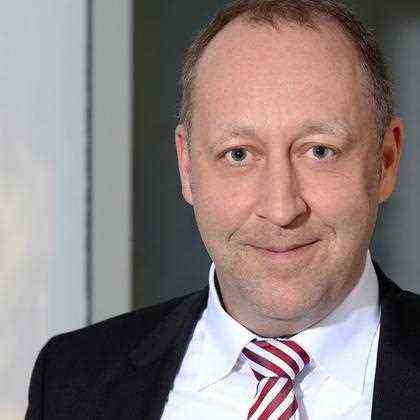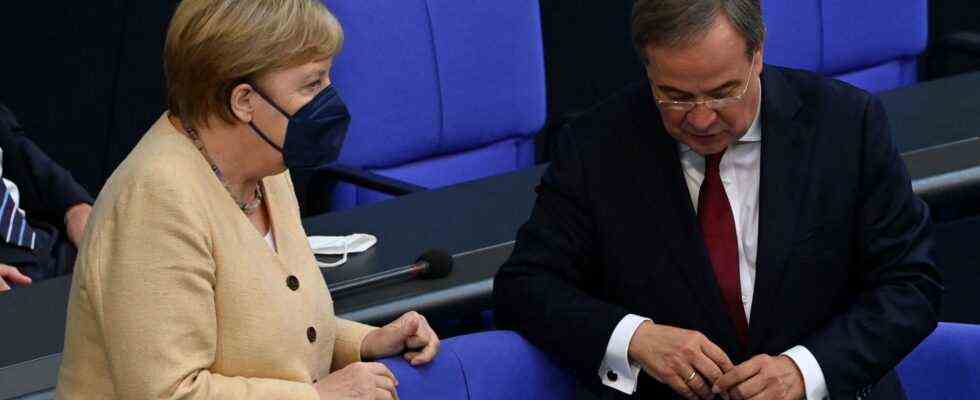analysis
Status: 08.09.2021 8:16 p.m.
In view of the weak polls, Chancellor Merkel is intervening more strongly than planned in the election campaign. Because Laschet can use any help. Does that help? Pollsters are skeptical.
What is the matter with Merkel, many asked themselves when, surprisingly, on Tuesday she turned the presumably last Bundestag session of this legislature into an electoral arena. She is often said to have a presidential style of leadership. She actually wanted to stay out of the election campaign for her successor. And now that.
If need be, Merkel corrects her plans, she is known for that. Apparently, with the Scholz course, it was enough for her to copy them. In addition, there was resentment in the party that they let CDU Chancellor candidate Armin Laschet hang. And now it happens in the last few meters of her chancellorship, of all things directly in parliament, which she had elected chancellor with votes from the SPD. She warns of red-green-red and criticizes her – always loyal – Vice Chancellor Olaf Scholz.
Not to remain inactive during the sad election campaign?
What happened? Did she no longer want to stand idly by the tragedy of the Laschet election campaign? Sure, your party is doing badly, not only since the first polls have now fallen below the twenty percent. She could have burst her collar earlier, in view of the circling of ambitious CDU men, at the latest since Annegret Kramp-Karrenbauer had thrown annoyed as party leader in February 2020.
First he takes over the “Merkel diamond”, then that
The Chancellor had long been displeased that SPD Chancellor candidate Scholz copied her recipe for success – for example on the front page of the magazine of the “Süddeutsche Zeitung” with the famous gesture, the “Merkel diamond”. He’s walking around like a Merkel clone and at the same time adding populist accents to the corona policy he has agreed with, it is said in CDU circles: Scholz had called those who had already been vaccinated a “guinea pig” several times. However, always in connection with promoting the vaccination: “It turned out well for us – consider us (vaccinated people) as your guinea pigs,” he called out at an SPD event in the direction of vaccination skeptics. It was irony, he said afterwards.
Merkel, in turn, used this in the Bundestag as a template for her first violent public criticism of Scholz: Politicians must convince people to vaccinate, “and not with crooked pictures of guinea pigs.” At the same time to warn against a red-green federal government with the support of the Left Party, on the other hand a union-led one with Armin Laschet for “measure and middle”. A slogan with which Merkel liked to advertise.
Long hesitation to intervene in the election campaign
Actually, the CDU should now be particularly grateful to Angela Merkel: the party had waited a long time for this. Some had previously wished for more clear support for Merkel in the election campaign – now she is even running in her former constituency together with Laschet – five days before the election, she wants to present herself with him on September 21 in Stralsund. The fact that the date is only just being announced shows her reluctance to intervene as an election campaigner at all.
But two and a half weeks before the general election, the trend towards Scholz is solidifying. Election researchers see no signs that could bring about a turnaround for the candidate Laschet, who is also unpopular among his own party supporters. The probability is decreasing increasingly, says Nico Siegel from the opinion research institute infratest dimap, which regularly compiles the Germany trend for the ARD: “First of all, the candidate for chancellor does not ignite, on the contrary: his very low popularity and competence values are one of the main problems in this election campaign” the demoskop. Secondly, the Union is still finding it difficult to score points in terms of content on important issues: Thirdly, there is a lack of unity.
Could Merkel’s popularity ratings still rub off?
At the moment, the principle of hope for a late turnaround rules at the CDU and that Merkel’s stronger presence could rub off a few percentage points of her outstanding popularity ratings. She is now ready for this – not only because she is annoyed about being taken over by Scholz. Through the CDU, it has become what it is – it has not forgotten that. A Union destroyed on the ground at the moment in which she resigns after 16 years of chancellorship, she does not want, it is said in her environment.
In the party headquarters you don’t want to give up the fight for first place. Merkel must tear it now, and new narratives – away from the person of Laschet. Hardly anyone believes that he can find out his personal suitability and popularity values from the survey cellar.
Armin Laschet during the election campaign in Erfurt.
Image: REUTERS
“Future team” should help
Therefore, the “future team” should now help – as well as the message that on election day there will be parties, not people, to vote. And who knows whether a few SPD voters won’t stay at home when Scholz is already the winner in advance, but additional hesitant Laschet skeptics prefer to vote for the Union to prevent a red chancellorship.
The search is desperately for a topic with which the CDU can still be prominently linked. There will be no more climate protection. And, of all things, when it comes to work, social affairs and health, there is a lack of a Norbert Blüm type, a kind of social conscience. Laschet may have thought for too long that he could be all of these for the Union at the same time.
Withdrawal movements visible
But even in the CDU it is clear that it may now only be about second place: Optimists there then say that a Jamaica coalition would still be there: One of the last wild cards Laschet has is an extremely good relationship with the FDP -Chef Christian Lindner. But even this is moving noticeably away from the Union. And Jens Spahn, who still loyally campaigned for the CDU chairmanship for a “decade of modernization” at Laschet’s side, is currently more noticeable in the election campaign because of his absence: there is no other way of interpreting it. It gets lonely around Laschet.
Despite Merkel’s help: Laschet now has to deliver
Now Laschet has to deliver, grow far beyond its previous form of election campaign – and score points at appearances like the Triell next Sunday. For him personally, it’s about everything: because in the event of a landslide loss of the first Post-Merkel CDU, personal consequences for Laschet and CDU General Secretary Paul Ziemiak can no longer be ruled out on the evening of the election.
Well-meaning people in the party compare Laschet with the film character Rocky: A kind of German Sylvester Stallone, who initially hangs out in the boxing ring without a chance, only to get up again – and in the end to win.

Pollsters about CDU election campaign
tagesschau.de: How could Laschet turn the tide?
Nico Siegel: The current trend speaks against the Union for several reasons. It is basically possible to turn it, but the probability is decreasing increasingly. Firstly, the candidate for chancellor does not ignite, on the contrary: His very low popularity and competence values are one of the main problems in this election campaign.
Second, the Union is still struggling to score in terms of content on important issues: The Laschet team lacks a prominent figure who, as an expert on social and labor market policy, could stand up to the SPD campaign with a strong focus on issues such as minimum wages or secure pensions. Thirdly, there is a lack of unity at the top, across the party levels. The strong headwind in the mood of the population makes it difficult for a common jolt to go through the party.
tagesschau.de: Has there ever been such a volatile election campaign?
Seal: There were rashes, as is currently the case, in the 1994 federal elections, at that time in favor of the CDU / CSU under Helmut Kohl – and, to the chagrin of the SPD, with its candidate for Chancellor Rudolf Scharping. And in 2002 and 2005, with Gerhard Schröder at the top, the SPD managed to gain seven percentage points in our polls over the course of a few months. The current volatility goes in several directions: Because the party system has become more differentiated and more fragmented, and the proportion of those eligible to vote with solid party affiliations is declining.
tagesschau.de: How big is the camp of the currently undecided?
Seal: Around 30 percent have not yet answered the following questions for themselves: Will I vote or not? Who do I vote with first and second vote? However, the undecided are not all “open in all directions”. In this respect, it would be unrealistic for any party to assume that the large majority will ultimately lean towards exactly one party.
Nico A. Siegel is the managing director of the opinion research institute Infratest dimap.

